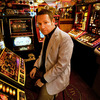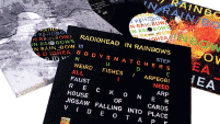There's a lot going on in this edition of Armchair Dancefloor, so let's skip the formalities.
First up, we've been speaking to one of the most important figures in UK electronic music: dubstep originator and Tectonic label boss Pinch. There's also the chance to win tickets to catch Pinch, plus a host of other iconic British DJs, at Bristol's In:Motion this NYE - details below. And, as ever, in The Playlist you'll find a pick of the most interesting new and upcoming electronic releases.
Focus: Pinch/Tectonic
To describe Bristol-based producer and Tectonic label boss Rob Ellis (aka Pinch) as an important figure within dubstep would be something of a massive understatement. His 2007 album Underwater Dancehall was one of the first properly coherent full-length statements to come out of the scene; it harnessed the earth-shaking potential of dubstep bass and combined it with eastern instrumentation, creative vocals and the influence of soundsystem culture to create something that transcended its club roots to become one of the genre's first crossover successes. In the early days of the scene, the Context nights he hosted in Bristol were the first to support dubstep's outside of London, and the Subloaded nights he runs now remain one of the country's most important underground club brands. Meanwhile, with Tectonic - the label he has run since 2006 - Pinch has provided a home for releases from the likes of Joker, Loefah, Digital Mysticz, Kryptic Minds, Flying Lotus, 2562 and loads of others. It remains one of the UK's most consistent electronic labels, with a roster that - much like Ellis's own sets as a DJ - still pushes things forward whilst remaining rooted in the thick, meditative sonics of dub, amidst an increasingly fractured UK dance scene.
He has a new record out this week: Pinch: MIA 2006-2010. It's a compilation that rounds-up some of the producer's more under-the-radar releases away from Tectonic, forming a glimpse at some commonly overlooked, but nonetheless excellent, moments from the first part of his production career. We thought it the perfect opportunity to catch up with him to talk Tectonic, up-coming projects and the state of dubstep in 2012.
Explain the background to the MIA record, why bring out a release like that now?
“Well, it started about six months ago, I was checking out some things on YouTube and in the related videos down the side I saw one of my own tunes from around 2007. It had a couple of comments on it, people talking about it as if it were a new release. Although it’d only been uploaded not that long ago it had about 60,000 hits on it, and I thought that was interesting - maybe for a few people some of these older bits might still sound fresh, given that there’s a whole new generation that has only gotten into dubstep over the past couple of years. That kick-started the idea really; I thought it might be nice to put together a package of some tracks that I really enjoy but maybe slipped through the net a little, and were perhaps good enough to have something of a second wind.”

Aside from that, am I right in thinking you’ve got a collaborative LP with Adrian Sherwood in the works?
“Absolutely, there’s a small thing that’s just come out on his new EP on On U-Sound - which was a quick thing me and Adrian Sherwood did together - but the main thing that we’re working on is a full album project, which is close to the finishing line. I’ve got another trip booked to his studio next week, then we can hopefully mix it all down and it’s done.”
Have you been working on that whole project in his studio then?
“The process has mainly involved me starting off beats and ideas at home in my studio, then bringing the parts down to Adrian’s and fleshing them out with studio musicians, samples and acappellas, some bits from his own catalogue, obviously with Adrian putting his own input into everything along the way. Then ultimately it will all be mixed down and dubbed out on the desk by Adrian. So there’s multiple processes going on; there’s me doing stuff independently, stuff going on together, and stuff that he’s predominantly doing.
“I’ve never worked with someone in quite the same way and it’s a really interesting way of approaching things; the whole old-school desk aspect means that a lot of the things I might spend hours painstakingly drawing in with automation is something that he does instinctively and momentarily, so it has this real natural energy.”
So you end up mixing parts almost live?
“Yea, it’s live but obviously you can have as many takes as you want, so there’s two side to it and it works quite well. But yea, it’s a really great project and I think there’s some awesome tunes; a mixture of dubstep flavoured stuff and trip-hop and dub flavoured cuts, and stuff at tempos that no one seems to DJ at [laughs]. I’ve no idea if it will work in DJ sets, but I think it should be a really good listening experience.”
So how does that process compare to the collaborative projects you’ve done in the past, the LP you put out with Shackleton last year, for instance?
“That involved much more of us literally working together, in the same studio at the same time. We both put it together from scratch essentially. There were only a few moments when we [separately] did a few little bits and pieces to some of the tracks right at the end, just for the sake of efficiency, to make sure we got everything together in time. The main difference is that there we did the whole thing in the same room whereas with Adrian there’s been a number of different processes involved. There are benefits to feeling comfortable on your own in the studio, and there are benefits to bouncing ideas off someone and getting a vibe going. It’s just good to try different things.”
That’ll be two collaborative albums in as many years, is that a sign that you prefer working in partnership with other producers these days?
“I enjoy working alone as well... I guess I’ve found it difficult to make as much time for myself as I have for other collaborative projects. Let’s face it, when someone like Shackleton, who’s a good friend, says ‘Let’s do an album’ you’re not going to turn around and say no. And with Adrian Sherwood, I grew up listening to the On U-Sound catalogue through my older brother, so I’ve been familiar with his stuff since I was about nine years old - so to be working with him is a really exciting opportunity. So, I guess my principal is not to turn down exciting opportunities when they come up, and hopefully there’ll be time to do a solo album in between.”
So you do see yourself making another solo album?
“Yes, it’s something I very much want to do but I’d like to give it a bit of a different approach and I’m still working out what exactly that’s going to be. I had certain ideas that I don’t think are quite going to work out as I initially thought, but I’m working on some ideas around it.
“I plan to finish this project with Adrian and then I’ve an interesting project coming up in January - I’m going out to Nigeria with Rob Smith (RSD) to collaborate with Lagos-based local musicians. I think the idea is we’re going to take back what we record and try and turn that into another collaborative project, hopefully with a slightly shorter timeframe though. I do want to get stuck in to [another solo album], but I kind of want to stop talking about it because every time I say ‘Yea, I’m going to start on a new album this year’ I get to the end of the year and find I haven’t done it [laughs]. That’s kind of what happened this year again, so I’m not going to say when or how it’s going to emerge, but hopefully it will.
“For me making music is very much a hobby that I enjoy, it’s turned into my living, which I’m eternally grateful for, but first and foremost I look forward to it as a pleasurable thing, so I’m very careful to not try and force myself into making stuff. I don’t think the right tunes come out if you do that, whereas if you’re a bit more relaxed about it and let it happen more organically, for pleasure’s sake, then the material that comes out is certainly more honest, if not better.”
Turning to Tectonic - and going right back - what inspired you to start the label in those early days?
“That scene was microscopic at the time; I sort of stumbled upon it and instantly fell in love with it. For years I was a die-hard jungle fan, but it got to the point where I was disillusioned with that scene and the music had got into that ‘recycling of ideas’ period and had lost the momentum that it once had. I was looking for something and didn’t know where I was going to find it. I liked techno and I liked dub, garage and jungle, and I just found that [dubstep] brought in elements of all these different things in a very natural way, and mutated it into these awesome percussive, experimental types of rhythm and moody cinematic soundscapes. I completely fell in love with it.
“At the time there was literally just a handful of labels. When Tectonic started DMZ had done maybe one or two releases, so there really wasn’t much going on dedicated to that scene outside of Tempa; so for me it was just a no-brainer. I didn’t ever think it was going to turn in to something that would be successful in the long-term; I certainly didn’t imagine us putting out albums. I never really imagined we’d get passed ten releases or something like that. It just grew organically; there were a lot of good people around me at the time who were giving me tunes on dubplate but had no homes for them.”
How has running the label changed since 2005? Obviously in those early days you had a fairly intimate cluster of producers it pick releases from, is it harder selecting music to release now that the internet has opened things up to a global scale?
“The spirit of excitement that I got from the early days of dubstep was about perusing whatever was at the end of that progressive force in UK dance music. Like you said, it’s a very globalised scene now and with the internet these small niche scenes can pop up in small obscure towns all across the world but still be connected in spirit. Essentially, the vibe of the UK rave scene as it developed - from hardcore to jungle to garage and grime and dubstep - that has always been the momentum of development I’ve been interested in.
“In the last few years we’ve seen dubstep hybrid up with various other scenes; taking on elements of footwork with the Addison Groove sound, right through to the house tempo stuff that the likes of Swamp81 are pushing. For me, it’s now just about finding music that’s interesting and doing something that’s new. The spirit of that early dubstep template the label took on I think is deeper than being bound by tempo, and it’s just about taking a chance and trying out new things and seeing what direction things go in. Hopefully people see that reflected in the output of the label, which I guess in the past 18 months has become a little unhinged from its dubstep origins.”
I guess from an outsider’s perspective, there seems to be an overall mood or texture thing that ties Tectonic’s output together...
“Absolutely, that’s one of the main things I’ve wanted to achieve with the label - establishing a certain mood. I’d like to think that people would consider us as a label that wouldn’t just release anything just for the sake of experimentation or trying to make a point; it has to fit the - fairly indefinable - ethos of the label. I guess that really just stems from my own taste.”
How has the way you select tunes as a DJ changed over that same period of time? You’ve a reputation for being a bit of a purist, in terms of sticking to the moods of early dubstep, is that fair to say?
“Yea, I still enjoy the ends of dubstep I’ve always been interested in, admittedly it’s been harder in the last couple of years to find material that excites me. Of course, you can’t really be expected to encapsulate the experience of the earlier years, because back then the whole thing was new and didn’t have any history, so it was more mystery than history at the time. As long as you have that kind of sensibility surrounding a scene then there’s the excitement of not knowing which way it could develop. The more it’s developed and the more it’s been mapped out, the harder it is to find surprising things. But I still love the music and for me there’s still interesting producers out there looking to push the boundaries and develop things.
“I’d much rather hear that, even if it’s not as well produced. I’ll often get stuff through that’ll have an absolutely pristine half-step rhythm and a dark mood and I’ll have to be like, ‘Yea, that’s cool and it sounds great, and if you’d sent me that four years ago I would have jumped on it, but that’s a perfection of someone else’s sound you’ve got there.’ I’m more interested in trying to scout out what’s close to the cutting edge.”
So how do you come to sign the music Tectonic releases these days? Does a lot of it come from stuff you’re sent online, or do you still prefer to pick things up through word-of-mouth or meeting producers in person?
“It’s not very often that I’ll work with someone without meeting them in person, or at the very least speaking on the phone. I kind of feel that, in the current days of social media, it’s very easy to make assumptions when you just see a piece of text in front of you and not get a vibe of where a person is coming from and what they’re about.
“I do get sent a lot of demos, and I very guiltily admit that I can’t listen to all of them, but more often than not things tend to come to me either directly through people I’ve met. Often when I’m playing out somewhere I’ll get given some tracks on a USB and check them out. Occasionally I’ll come across someone more randomly; for example, 2562 just hit me up on MySpace, same thing with Pursuit Grooves. Then again, someone like Distance I’ve known for years, and I’d hear him play tunes out and bug him to let me have them for Tectonic, and I’ve managed to wrestle a few tunes from friends in that sort of fashion. Generally speaking, if I like something I’ll cut it to dub and play it out for a couple of months, to get a feel for how it works and how people react to it before locking it down to the label.”
It’s interesting that you say that; it seems to be an increasing rarity to find DJs still cutting things to dubplate, why do you choose to stick with it? Is it a sonic thing or is it about preferring the physical nature of it?
“It’s a combination of a few factors. I like the tangibility of it; it’s something you can put your hands on, and you can see the grooves to give you an idea of when a breakdown is coming. I do like the sound of vinyl though; it’s a little bit warmer, and when a dub is cut there’s an element of mastering so you get a consistency that you don’t necessarily get if you’re playing CDs of unreleased music, as every producer is going to have their levels a little bit different. First and foremost though, I grew up learning how to do it on vinyl and I just enjoy mixing with it. I’ve tried it with CDs and it’s not that I can’t do it, I just find it a cold process; it feels like you’re being removed from the music, to an extent. I know it sounds a little bit hippy-ish but I feel more bonded with the music when I’m playing vinyl, and that just works for me. I’d never turn around to someone else and tell them that playing CDs is a cop-out; I don’t give a shit about that, each to their own. People find their own ways of getting on with it, for me that just happens to be playing vinyl and dubs and that’s what I like.”
Finally, as a producer and DJ who’s very much associated with the development of a specific sound, what’s your take on the way dance music seems to be developing in the UK right now? Things seem to be less tribalised right now; there’s so many micro-genres and less definition between genre or tempo boundaries.
“There’s two side to it; on the one side, there’s no such thing as rules apart from what you believe, there is no reason why you can’t play a variety of tempos in your set, but to do it skillfully is actually a different matter. From personal experience I’ve found that, more often than not, I need to sit with a certain tempo for a certain amount of time before I settle in to it. It depends how it’s done, it’s more difficult to play a wide range of tempos and do it successfully.
“There’s another side to it though. As you said, dubstep was initially like a tribe of dance music and there was that sense of community; people working on tracks together and DJing and supporting the scene. It felt like an extended family. I think that when you have a completely eclectic night of music you have to remember that, for some of those sounds to have got there, you need scenes to develop and you need communities to develop so that a style of music can really develop into something above and beyond merely a few loose tracks at a roughly similar tempo. **That community only really comes about when you have a scene. You can’t have these new scenes develop successfully if the only place to hear the music is these few tracks here and there or as one brief part of a DJ set.
“Taking that question a little bit further, I’ve often puzzled over why things are arranged in tempo-based categories. Obviously it’s an easy way of separating things out but, for instance, a classic Photek record and a contemporary DJ Fresh record are both in the drum and bass category when they’re actually about as far apart as you can get. Actually that Photek record has more in common with some old Basic Channel techno record, but that’s going to be sitting in the opposite end of the record shop in a different category. For me, perhaps the way forward is categorising music by the mood and vibe, rather than just the tempo. Perhaps things will move over the next few years to a situation where DJs are known for the mood and atmosphere they bring, rather than just a catagerisation like dubstep, which lumps Kryptic Minds and Skrillex side-by-side when the only thing they’ve got in common is a rough tempo and little else.”
Competition: win tickets to catch Pinch and loads more at In:Motion, Bristol this NYE
This New Year’s Eve will see Subloaded and Swamp81 take over the 2nd warehouse of Bristol’s Motion to host Pinch, Loefah, Boddika, Peverelist and Kowton as part of a NYE party that also features the likes of Plastician, Mele, Marcus Nasty and Sub Focus. We have a pair of tickets to give away.
To win, you don’t even need to answer a question, just let us know your opinion: Tell us your favourite electronic/dance tune of 2012 Let us know using the comment section below this feature and we’ll pick a winner at random next Friday, 23 November.
In:Motion also have a number of other impressive line-ups coming up over the coming weeks, including upcoming joint ventures with Futureboogie - featuring Kerri Chandler, Waifs and Strays and George Fitzgerald - on 23 November, and Cocoon - headlined by Sven Vath and Seth Troxler- on 30 November. Check out full details of all their events over at the In:Motion site.
The playlist: new and forthcoming releases
Arkist - Two Night Stand [Inhale]
Following a flurry of releases throughout 2011, on labels including Hotflush and Apple Pips, Bristol-based producer Arkist has been noticeably quiet over the past year. This 12” on Inhale is a good way to make up for the absence though. The a-side is proper infectious floor-filler stuff; combining energetic, grime-leaning synths and a heavily swung garage beat. It’s b-side ‘Spiderdurdge’ that’s the winner here though, stepping into surprisingly beefy techno territory - powered by an upfront bassline and peppered with slightly psych-tinged arpeggio breakdowns.
Dense & Pika - Crispy Duck [Hotflush]
Jack Dixon - E/Find Shelter [Hotflush]
Scuba’s Hotflush imprint has been on especially strong form in the latter half of 2012 - recent releases from Shelter Point, NeferTT and Sigha have all been up with the years best, and Scuba’s own recent flurry of activity has yielded some stellar results.
These two latest 12”s do nothing to break that run of form. With ‘E’ Berlin-based producer Jack Dixon serves up one of the year’s most infectious underground house tunes, built around a classic meaty bassline and layers of hazy, saturated synths. Meanwhile, UK duo Dense & Pika deliver three-tracks worth of completely on-point underground techno with their Crispy Duck. ‘E’ is out now, Crispy Duck is due 3 December.
Joy O - Big Room Tech House DJ tool - Tip! [NonPlus+]
As seems to be the Joy Orbison way these days, there’s little-to-no release info available for this one. Boddika’s recent chart on Resident Advisor lists it as a NonPlus+ release though, which suggests that’s where it might live if and when it does emerge (bearing in mind that we’ve been waiting well over a year now for JO favourite ‘GR Etiquette’).
Release info aside, with its bouncy low-end and sparingly used Tevin Campbell vocal sample ‘BRTHDT-T’ is everything you could want from a Joy Orbison classic. (In case you’re wondering, the title is a sly nod to the track labeling conventions used by online record store Hard Wax.)
Karenn - SHEWORKS004 [Works The Long Nights]
Karenn is the collaborative project of Blawan and Pariah. These joint releases seem them making hard-edged techno produced using hardware drum machines, synths and samplers. To be honest, the results aren’t a million miles away from Blawan’s recent solo output, but that’s no bad thing. This fourth EP may well be the best thing they’ve done to date - the excellently titled ‘A Room Full Of Fuck All’ is particularly special. Out now on the pair’s own Works The Long Nights label.
DVA - Fly Juice EP [Hyperdub]
Following the release of his debut LP, Pretty Ugly, a few months back DVA returns to Hyperdub to round off 2012 with a double EP of unique and brilliant techno. Fly Juice EP sees DVA working the lively UK funky sounds he’s known for into a new template of harder four-four dance music; it’s probably the most impressive thing he’s done to date. Hype Williams’ Inga Copeland provides guest vocals and French Fries provides a remix.
Loops Haunt - ZENITH [Black Acre]
Scottish producer Loops Haunt has had something of a curious career trajectory; he seems to have a habit of popping up from under the radar once every twelve months, releasing one of the year’s most impressively diverse, sprawling and eclectic releases, and then disappearing for another year. He unveiled a brilliantly bizarre take on dubstep in 2010 with ‘Rubber Sun Grenade’, returned towards the end of 2011 with a sprawling synth-funk odyssey in the form of Ark and now he’s back as 2012 comes to a close, once again on Bristol label Black Acre.
His most substantial and also most cohesive release to date, ZENITH strips back some of the colourful synths of his previous outings and builds instead upon sampled material. Sonically it veers chaotically between the sounds of classic hip-hop, drum breaks pillaged from hardcore and jungle and horror soundtrack-style synths. In all it’s bizarre stuff, but essential nonetheless. Out 3 December.
My Nu Leng - The Grind/Hips N’ Thighs [877 Records]
Two hugely infectious, dancefloor ready productions from Bristol-based newcomers My Nu Leng. ‘The Grind’ is a bassy house number straight out of the Mosca/Huxley etc school of instant floorfillers. B-side ‘Hips N’ Thighs’, meanwhile, sees the duo teaming up with Majora for a vaguely hiphop leaning drum machine house workout. Out now.
Ruff Sqwad - White Label Classics [No Hats No Hoods]
The relatively long awaited White Label Classics compilation collects 22 out-of-print instrumental cuts from seminal grime outfit Ruff Sqwad. As a collection, it does a great job of hitting home just how influential classic era grime has been on shaping the sound of modern dance music. The synth-heavy tracks on display are richly produced, rhythmically complex and - surprisingly perhaps - often genuinely beautiful. The comp comes complete with a 16-page booklet of classic photos and interviews. For anyone with a passing interest in the grimier ends of electronic music, this should go straight to the top of your Christmas list.
Wen vs Epoch - Hydraulics/Hydraulics (Epoch Bass Mix ft. Joshua Idehen) [Egyptian Avenue]
Rising producer Wen has been causing quite a buzz recently, with Blackdown being a particularly vocal champion his work. This recent single - a collaboration with US artist Epoch on his new Egyptian Avenue label - is a good example of why Wen deserves that hype; a fantastic combination of mournful grime synths, a fractured garage beat and thick atmospherics. However, Epoch’s moody-as-hell rework on the b-side, featuring LV collaborator Joshua Idehen, is probably the show stealer of the two.
Wen has another release in the pipeline, ‘Lo-Fidelity/Takin’ Over’, which again christens a US artist’s new label, this time Blind Prophet’s South Fork Sound. Preview that one on SoundCloud.
For occasional links to new music, mixed with a lot of inane nonsense, you can follow Si on Twitter here.























